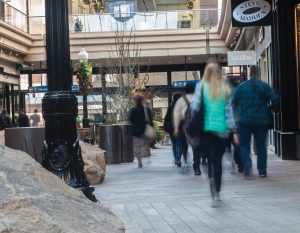Christopherson: Let’s Replace Black Friday with Buy Nothing Day
An advertisement for a Black Friday sale at City Creek Mall in Salt Lake City. (Photo by Cara MacDonald | Daily Utah Chronicle)
December 7, 2019
This year, Americans spent more money over one Thanksgiving weekend than they have since Black Friday began. In-store shopping grew 4.2% from 2018, and online spending reached a record high of over $11 billion between Thursday and Friday. Many travelled long distances for big sales, collectively spending much more on clothes, sporting goods and electronics.
Unfortunately for my wallet and sleep schedule, I was among the shoppers out and about in the wee hours of Friday morning. The day began when my roommate and I raced to Sugar House to shop a midnight sale. We spent the rest of the day nabbing deals on coats and jeans at City Creek Mall, vintage sweaters at the Fellow Shop on Broadway and even 10% off ear piercings. We came home thrilled with our purchases – but our bank accounts weren’t the only thing that suffered in order to make our shopping spree possible. The lavish consumerism exemplified by Black Friday hurts people and the planet far more than our pocketbooks.
We often think of cars, government oil subsidies and inefficient home heating systems as the greatest risk to the environment, but household consumption is the biggest contributor to climate change. According to a 2015 study, the things we buy — be they food, clothes, jewelry, furniture or toys — are responsible for 60-80% of global greenhouse gas emissions.

This is on us. That doesn’t mean public policy can’t combat climate change — on the contrary, lawmakers have the power to shape our spending habits — but it does mean that every purchase we make has ramifications for our planet now and in the future. When we look at the news and feel frustrated and terrified by the wildfires in California, the tropical storm in Bermuda and the hurricane in the Bahamas, we should remember to trace some of the responsibility for those disasters back to our own burgers, smartphones and briefly trendy outfits.
As if the racial inequalities and class disparities that come with climate change aren’t bad enough, the devastating consequences of American consumerism has an immediate effect on current labor conditions. Cheap products demand cheap labor, which causes both foreign and domestic workers to be woefully underpaid. Farm workers, for example, not only earn unethically low wages, they also suffer from dangerous working conditions, physical abuse, child labor and other issues. Our consumption of seemingly low-cost foods, clothes and products – especially at Black Friday prices – facilitates and is dependent upon this kind of exploitation.
If you’re someone who feels unmotivated by massive, abstract injustices, there’s an argument against consumerism for you yet. University of Utah professor Phillip Bimstein teaches a class called Radical Quiet that discusses minimalism and overcoming the widespread idea that having more makes us more worthy, happy and complete. There is freedom and power in letting go of materialist ideals to open up the space for us to be mindful of our well-being and deliberate about what we eat or wear or keep in our homes. It checks the insatiable desire to have more than other people or better than what we currently have. Physically and psychologically decluttering our lives enables us to see and understand ourselves more clearly.
Black Friday communicates the opposite. It stands for a toxic, perpetual sense of discontent and competition — so it’s time we develop a few alternatives.

An effective, if extreme, option is Buy Nothing Day. It’s a self-explanatory but powerful idea: a day to avoid spending money – and participation in the exploitative and environmentally unfriendly effects of our economy – altogether. Though it might be unlikely that enough people would celebrate it to put a serious dent in the billions of dollars Americans pour into Black Friday and Cyber Monday every year, there’s something to be said for simply deciding not to contribute to the problem.
For those who can’t resist taking advantage of a good sale, there’s a milder option. Small Business Saturday makes holiday shopping a little less expensive while boosting local economies and strengthening communities. Supporting Small Business Saturday (especially for thrifted or locally produced goods) over huge corporations can reduce our carbon footprint and send a message that we expect companies to offer their employees fair wages and good working conditions.
The next Black Friday — or Buy Nothing Day, or Small Business Saturday — is almost a year away, but the sad realities of consumerism persist every day. Stepping back to reevaluate our consumer habits before we finish buying holiday gifts or write our next grocery list is an important part of saving the planet, protecting human rights and finding inner peace.








